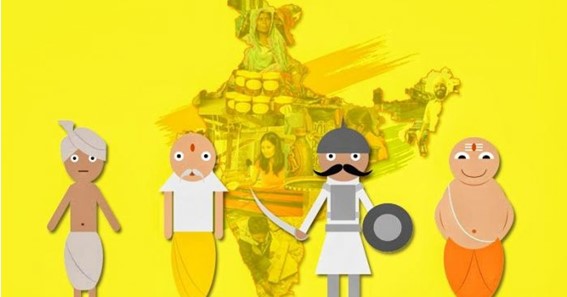Are you curious to know what is varna system? You have come to the right place as I am going to tell you everything about varna system in a very simple explanation. Without further discussion let’s begin to know what is varna system?
What Is Varna System?
The Varna system is a social and occupational hierarchy that has played a significant role in Indian society for centuries. Rooted in ancient Indian scriptures, the Varna system categorizes individuals into distinct social groups based on their birth, occupation, and social status. In this blog, we will explore the origins and principles of the Varna system, its historical context, its evolving interpretations, and its relevance in modern-day India.
Origins And Principles:
The Varna system finds its roots in ancient Hindu scriptures, particularly the Rigveda, one of the oldest religious texts in the world. According to these scriptures, society was divided into four main Varnas, or varnas (color), which are:
- Brahmins (Priests and Scholars): The Brahmins were considered the highest Varna, responsible for studying and teaching religious texts, performing rituals, and providing spiritual guidance.
- Kshatriyas (Warriors and Rulers): The Kshatriyas were assigned the role of warriors, rulers, and administrators. Their duty was to protect the society and maintain law and order.
- Vaishyas (Merchants and Agriculturists): The Vaishyas engaged in trade, agriculture, and business activities. They were responsible for producing and trading goods to sustain the economy.
- Shudras (Laborers and Servants): The Shudras performed manual labor and provided services to the other varnas. They were considered to be the lowest in the social hierarchy.
Historical Context And Evolution:
The Varna system originated in ancient times as a means to establish social order, division of labor, and interdependence within society. The system aimed to assign specific roles and responsibilities to individuals based on their inherent qualities, skills, and family lineage. Over time, the Varna system became deeply ingrained in Indian society, influencing social norms, marriage practices, and occupational choices.
However, it is important to note that the Varna system was not always rigid or hereditary. Historically, individuals could move between Varnas based on their skills, qualifications, and achievements. This fluidity allowed for social mobility and ensured that individuals were not confined to a predetermined social status solely based on birth.
Modern Interpretations And Challenges:
In contemporary times, the Varna system has undergone significant transformations. India’s constitution guarantees equality and prohibits discrimination based on caste, rendering the caste system, which is often associated with the Varna system, illegal. However, remnants of social stratification and discrimination continue to persist in some parts of society.
The Varna system is now commonly interpreted as a classification of occupations rather than a rigid social hierarchy. It is seen as a means to recognize and respect the diverse professions and skills that contribute to society’s functioning. Modern scholars argue that Varna should be determined based on an individual’s abilities, aptitudes, and interests, rather than their birth.
Critics of the Varna system argue that it has perpetuated social inequalities, caste-based discrimination, and hindered social progress. They emphasize the need for a more inclusive and egalitarian society that values individuals based on their capabilities and character, rather than their caste or birth.
Conclusion:
The Varna system, with its historical roots and complex social implications, has shaped Indian society in significant ways. While its original intent was to promote social order and interdependence, the system has faced criticism for perpetuating inequality and discrimination. In contemporary times, efforts are being made to reinterpret the Varna system as a means of recognizing diverse occupations and fostering inclusivity. As India continues to evolve socially and culturally, there is a growing emphasis on equality, social justice, and the recognition of individual merit beyond caste or birth.
You can collect more information on Getdailytech
FAQ
What Do You Mean By Varna System?
Varna system was a social classification of people based on their function and duties in society. People with certain skills and knowledge were put in different Varnas. It was not hereditary, which meant people did not born in certain Varna, they were put in a class according to their function and skills.
What Is The Varna System In History?
The varnas have been known since a hymn in the Rigveda (the oldest surviving Indian text) that portrays the Brahman (priest), the Kshatriya (noble), the Vaishya (commoner), and the Shudra (servant) issued forth at creation from the mouth, arms, thighs, and feet of the primeval person (purusha).
What Is The Varnas System In The Vedas?
‘Varna’ signifies the colour, kind, order, or class of individuals and specifies their ancestral roots. Brahmins (priests, gurus, etc.), Kshatriyas (warriors, kings, administrators, etc.), Vaishyas (agriculturalists, traders, etc.,sometimes known as Vysyas), and Shudras (labourers) are the four main types.
What Is Varna And Caste Short Note?
The term “Varna” is derived from the word “Vri” meaning, the choice of one’s occupation. Therefore, Varna is considered with one color or combination. On the other hand, Caste or Jati is derived from the word “Jana” which means taking birth. Therefore, caste is concerned with birth.
How Many Social Classes Are In The Varna System?
Varna may be translated as “class,” and refers to the four social classes which existed in the Vedic society, namely Brahmins, Kshatriyas, Vaishyas and Shudras.
I Have Covered All The Following Queries And Topics In The Above Article
Varna System Pdf
What Is Varna In Sociology
Characteristics Of Varna System
4 Varnas
Varna Hinduism
Varna System Vs Caste System
Varna India
Varna System In Vedic Period
What Is Varna System
What is the Varna system now
What is Varna in Hinduism?










